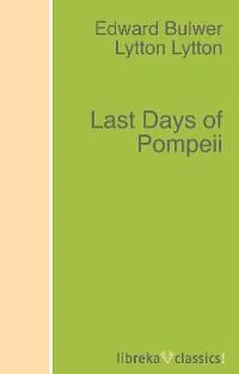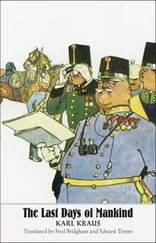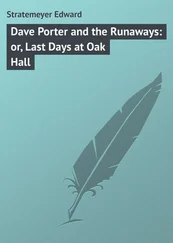Edward George Bulwer-Lytton - Last Days of Pompeii
Здесь есть возможность читать онлайн «Edward George Bulwer-Lytton - Last Days of Pompeii» — ознакомительный отрывок электронной книги совершенно бесплатно, а после прочтения отрывка купить полную версию. В некоторых случаях можно слушать аудио, скачать через торрент в формате fb2 и присутствует краткое содержание. Жанр: unrecognised, на английском языке. Описание произведения, (предисловие) а так же отзывы посетителей доступны на портале библиотеки ЛибКат.
- Название:Last Days of Pompeii
- Автор:
- Жанр:
- Год:неизвестен
- ISBN:нет данных
- Рейтинг книги:5 / 5. Голосов: 1
-
Избранное:Добавить в избранное
- Отзывы:
-
Ваша оценка:
- 100
- 1
- 2
- 3
- 4
- 5
Last Days of Pompeii: краткое содержание, описание и аннотация
Предлагаем к чтению аннотацию, описание, краткое содержание или предисловие (зависит от того, что написал сам автор книги «Last Days of Pompeii»). Если вы не нашли необходимую информацию о книге — напишите в комментариях, мы постараемся отыскать её.
libreka classics – These are classics of literary history, reissued and made available to a wide audience.
Immerse yourself in well-known and popular titles!
Last Days of Pompeii — читать онлайн ознакомительный отрывок
Ниже представлен текст книги, разбитый по страницам. Система сохранения места последней прочитанной страницы, позволяет с удобством читать онлайн бесплатно книгу «Last Days of Pompeii», без необходимости каждый раз заново искать на чём Вы остановились. Поставьте закладку, и сможете в любой момент перейти на страницу, на которой закончили чтение.
Интервал:
Закладка:
'My dear Glaucus!' said Clodius, 'I rejoice to see that your losses have so little affected your mien. Why, you seem as if you had been inspired by Apollo, and your face shines with happiness like a glory; any one might take you for the winner, and me for the loser.'
'And what is there in the loss or gain of those dull pieces of metal that should change our spirit, my Clodius? By Venus, while yet young, we can cover our full locks with chaplets—while yet the cithara sounds on unsated ears—while yet the smile of Lydia or of Chloe flashes over our veins in which the blood runs so swiftly, so long shall we find delight in the sunny air, and make bald time itself but the treasurer of our joys. You sup with me to-night, you know.'
'Who ever forgets the invitation of Glaucus!'
'But which way go you now?'
'Why, I thought of visiting the baths: but it wants yet an hour to the usual time.'
'Well, I will dismiss my chariot, and go with you. So, so, my Phylias,' stroking the horse nearest to him, which by a low neigh and with backward ears playfully acknowledged the courtesy: 'a holiday for you to-day. Is he not handsome, Clodius?'
'Worthy of Phoebus,' returned the noble parasite—'or of Glaucus.'
Chapter II
THE BLIND FLOWER-GIRL, AND THE BEAUTY OF FASHION. THE ATHENIAN'S CONFESSION. THE READER'S INTRODUCTION TO ARBACES OF EGYPT.
TALKING lightly on a thousand matters, the two young men sauntered through the streets; they were now in that quarter which was filled with the gayest shops, their open interiors all and each radiant with the gaudy yet harmonious colors of frescoes, inconceivably varied in fancy and design. The sparkling fountains, that at every vista threw upwards their grateful spray in the summer air; the crowd of passengers, or rather loiterers, mostly clad in robes of the Tyrian dye; the gay groups collected round each more attractive shop; the slaves passing to and fro with buckets of bronze, cast in the most graceful shapes, and borne upon their heads; the country girls stationed at frequent intervals with baskets of blushing fruit, and flowers more alluring to the ancient Italians than to their descendants (with whom, indeed, "latet anguis in herba," a disease seems lurking in every violet and rose); the numerous haunts which fulfilled with that idle people the office of cafes and clubs at this day; the shops, where on shelves of marble were ranged the vases of wine and oil, and before whose thresholds, seats, protected from the sun by a purple awning, invited the weary to rest and the indolent to lounge—made a scene of such glowing and vivacious excitement, as might well give the Athenian spirit of Glaucus an excuse for its susceptibility to joy.
'Talk to me no more of Rome,' said he to Clodius. 'Pleasure is too stately and ponderous in those mighty walls: even in the precincts of the court—even in the Golden House of Nero, and the incipient glories of the palace of Titus, there is a certain dulness of magnificence—the eye aches—the spirit is wearied; besides, my Clodius, we are discontented when we compare the enormous luxury and wealth of others with the mediocrity of our own state. But here we surrender ourselves easily to pleasure, and we have the brilliancy of luxury without the lassitude of its pomp.'
'It was from that feeling that you chose your summer retreat at Pompeii?'
'It was. I prefer it to Baiae: I grant the charms of the latter, but I love not the pedants who resort there, and who seem to weigh out their pleasures by the drachm.'
'Yet you are fond of the learned, too; and as for poetry, why, your house is literally eloquent with AEschylus and Homer, the epic and the drama.'
'Yes, but those Romans who mimic my Athenian ancestors do everything so heavily. Even in the chase they make their slaves carry Plato with them; and whenever the boar is lost, out they take their books and their papyrus, in order not to lose their time too. When the dancing-girls swim before them in all the blandishment of Persian manners, some drone of a freedman, with a face of stone, reads them a section of Cicero "De Officiis". Unskilful pharmacists! pleasure and study are not elements to be thus mixed together, they must be enjoyed separately: the Romans lose both by this pragmatical affectation of refinement, and prove that they have no souls for either. Oh, my Clodius, how little your countrymen know of the true versatility of a Pericles, of the true witcheries of an Aspasia! It was but the other day that I paid a visit to Pliny: he was sitting in his summer-house writing, while an unfortunate slave played on the tibia. His nephew (oh! whip me such philosophical coxcombs!) was reading Thucydides' description of the plague, and nodding his conceited little head in time to the music, while his lips were repeating all the loathsome details of that terrible delineation. The puppy saw nothing incongruous in learning at the same time a ditty of love and a description of the plague.'
'Why, they are much the same thing,' said Clodius.
'So I told him, in excuse for his coxcombry—but my youth stared me rebukingly in the face, without taking the jest, and answered, that it was only the insensate ear that the music pleased, whereas the book (the description of the plague, mind you!) elevated the heart. "Ah!" quoth the fat uncle, wheezing, "my boy is quite an Athenian, always mixing the utile with the dulce." O Minerva, how I laughed in my sleeve! While I was there, they came to tell the boy-sophist that his favorite freedman was just dead of a fever. "Inexorable death!" cried he; "get me my Horace. How beautifully the sweet poet consoles us for these misfortunes!" Oh, can these men love, my Clodius? Scarcely even with the senses. How rarely a Roman has a heart! He is but the mechanism of genius—he wants its bones and flesh.'
Though Clodius was secretly a little sore at these remarks on his countrymen, he affected to sympathize with his friend, partly because he was by nature a parasite, and partly because it was the fashion among the dissolute young Romans to affect a little contempt for the very birth which, in reality, made them so arrogant; it was the mode to imitate the Greeks, and yet to laugh at their own clumsy imitation.
Thus conversing, their steps were arrested by a crowd gathered round an open space where three streets met; and, just where the porticoes of a light and graceful temple threw their shade, there stood a young girl, with a flower-basket on her right arm, and a small three-stringed instrument of music in the left hand, to whose low and soft tones she was modulating a wild and half-barbaric air. At every pause in the music she gracefully waved her flower-basket round, inviting the loiterers to buy; and many a sesterce was showered into the basket, either in compliment to the music or in compassion to the songstress—for she was blind.
'It is my poor Thessalian,' said Glaucus, stopping; 'I have not seen her since my return to Pompeii. Hush! her voice is sweet; let us listen.'
'I must have yon bunch of violets, sweet Nydia,' said Glaucus, pressing through the crowd, and dropping a handful of small coins into the basket; 'your voice is more charming than ever.'
The blind girl started forward as she heard the Athenian's voice; then as suddenly paused, while the blood rushed violently over neck, cheek, and temples.
'So you are returned!' said she, in a low voice; and then repeated half to herself, 'Glaucus is returned!'
'Yes, child, I have not been at Pompeii above a few days. My garden wants your care, as before; you will visit it, I trust, to-morrow. And mind, no garlands at my house shall be woven by any hands but those of the pretty Nydia.'
Nydia smiled joyously, but did not answer; and Glaucus, placing in his breast the violets he had selected, turned gaily and carelessly from the crowd.
Читать дальшеИнтервал:
Закладка:
Похожие книги на «Last Days of Pompeii»
Представляем Вашему вниманию похожие книги на «Last Days of Pompeii» списком для выбора. Мы отобрали схожую по названию и смыслу литературу в надежде предоставить читателям больше вариантов отыскать новые, интересные, ещё непрочитанные произведения.
Обсуждение, отзывы о книге «Last Days of Pompeii» и просто собственные мнения читателей. Оставьте ваши комментарии, напишите, что Вы думаете о произведении, его смысле или главных героях. Укажите что конкретно понравилось, а что нет, и почему Вы так считаете.












